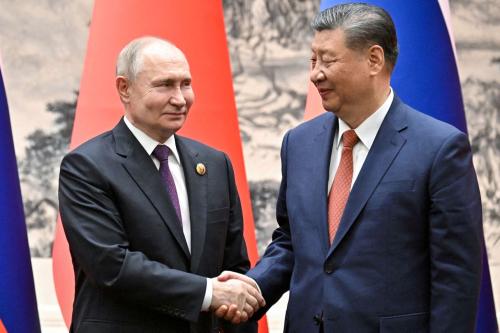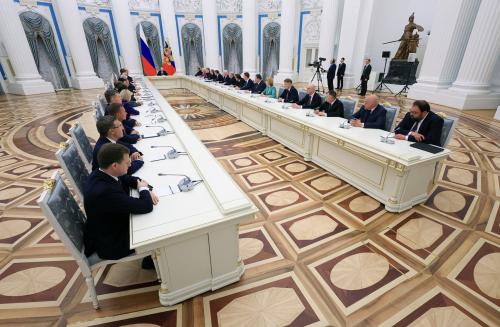With President Bush crisscrossing Europe in an attempt to repair badly frayed transatlantic relations, there is widespread agreement that unrestrained unilateralism is one of the main causes of the recent troubles. It is simply impossible, critics argue, to develop a balanced partnership when one of the partners believes it can decide what is right, act as it sees fit, ignore input from others, and expect that the partner will ultimately be obliged to follow along. The critics are right: If the relationship is to improve, Europe is simply going to have to stop behaving this way.
Okay, I’m exaggerating. The Bush administration of the first term richly deserved its reputation for ignoring allies’ advice and going it alone, whether on Kyoto, missile defense, a range of multilateral treaties, or of course Iraq. At the same time, it is hard to dispute that over the past several years the Europeans seem to be following Washington’s example and acting unilaterally themselves—even as the Bush administration is starting to understand the limits of its initial approach.
Europe doesn’t necessarily appear to be acting unilaterally because it is made up of individual countries. So when Europeans together adopt an uncompromising line and ignore the objections of others, the individual countries that make up Europe are technically acting multilaterally. But the tendency to view Europe as individual countries obscures the truth that the continent’s major powers increasingly act as a bloc on foreign policy. (The divisions among them over Iraq last year, more the exception than the rule, also help obscure this truth.)
Seen this way, it’s hard to escape the conclusion that in many of the areas where Bush has been most uncompromising, Europe (as a whole) has also adopted a unilateral posture. Today, the United States may be the most powerful and most assertive actor on the world stage; but on any number of topics, it’s not the only one behaving unilaterally:
The Environment
The Bush administration’s rejection of the Kyoto treaty on climate change was the initial poster child for U.S. unilateralism. Shortly after taking office, Bush simply pronounced the treaty dead and made clear he expected Europe to set it aside and adopt a different approach. Instead the Europeans only rallied to the cause. They refused to back down, all 25 members of the European Union ratified the treaty and persuaded others to do so, and the agreement actually came into effect last week—without the United States. At Davos a few weeks ago, Tony Blair appealed to the United States to get serious about environmental issues and asserted starkly that “if America wants the rest of the world to be part of the agenda it has set, it must be part of their agenda, too.” Blair has put global warming at the top of the agenda of the G-8 summit that Britain is hosting this year.
Iran
In the summer of 2003, without asking for Washington’s blessing, the governments of France, Germany, and Britain sent a delegation to Iran to begin negotiations over a compromise deal to end what appeared to be an Iranian nuclear-weapons program. The Americans resisted this attempt at outreach, insisted it would fail, and called on the Europeans instead to join them in campaigning for sanctions against Tehran. The Europeans steadfastly refused, kept up their dialogue with Iran, and have successfully resisted U.S. calls to report the issue to the U.N. Security Council. The EU-Iran negotiations are now the only show in town, and the Bush administration has grudgingly accepted that it has little choice but to support them.
China
When France and Germany began last year to call for lifting of the European Union’s arms embargo on China, imposed after the Tiananmen Square crackdown in 1989, Washington immediately objected and warned of serious consequences if the European Union agreed to do so. The Americans assumed they could count on Atlanticist allies like Britain and the Netherlands to stop the move. Now, after some internal European negotiations, the rest of the European Union has come around to the French and German view, and it is virtually certain that the embargo will be lifted this spring. European officials insist they will not back down over what they consider to be unreasonable U.S. objections, and British Foreign Secretary Jack Straw traveled to Washington last month to break the bad news: Lifting the embargo is basically a done deal.
The International Criminal Court (ICC)
In the late 1990s, European leaders strongly advocated setting up a standing international criminal court that would hold states and leaders accountable for serious crimes such as military aggression or genocide. When the United States objected to some of the court’s statutes, the Europeans effectively told America that they would proceed over Washington’s objections. The court now exists without the United States as a member and began operations last year. In 2002, the Bush administration launched a vigorous campaign to persuade some key European allies to grant exemptions from some of the ICC’s rules to Americans, which they have unanimously refused to do, despite U.S. threats to cut off military aid and withdraw from peacekeeping missions. The European Union is now pushing the U.N. Security Council to refer the Darfur crisis to the ICC, putting the United States on the defensive over a court that the Europeans basically willed into existence.
European Defense
When France, Germany, Belgium, and Luxembourg proposed in the spring of 2003 to set up European defense planning and operational capabilities separate from those in NATO, the United States vigorously objected and appealed to other European allies to stop the move. Again, however, the Europeans refused to let the Americans tell them what to do. Over enduring American objections, they agreed for the first time ever to set up a separate EU operational planning cell in Brussels and to start planning for potentially autonomous EU military operations. The planning cell the U.S. still objects to is now being staffed. And just in case the point was not clear, in a speech last week in Munich, Gerhard Schröder surprised his American counterparts by bluntly declaring that NATO was no longer the primary forum for transatlantic dialogue and calling for a panel to rethink the issue from scratch. So much for advance consultations.
Iraq
Iraq as European unilateralism? Certainly, it was the Bush administration that decided to pursue the war regardless of what its allies thought. But the idea was that once America demonstrated its leadership, the allies would be obliged to follow along; yet some key allies did not. France and Germany refused to give legitimacy to the U.S. operation and even campaigned globally—and successfully—to stop others from doing so. Since then, a number of European countries that did join the coalition—Spain, Hungary, Norway, the Netherlands, and soon Poland and Ukraine—have withdrawn their troops despite U.S. objections. France, Germany, and the European Union are now starting to contemplate offering some nonmilitary help—but on their own terms.
None of this, to say the least, is what the Bush administration had planned. When Bush came into office in 2001, his assumptions were that Europeans were weak and divided, and that the best way to win their support was to act decisively and expect them to follow along. Who would have thought that four years later, practically across the board, the Europeans would themselves be using this theory of alliance leadership? If Bush thought before his trip to Europe this week that it would suffice to say a few nice words in Brussels and watch the Europeans embrace his agenda he is likely to be sorely disappointed. Rather than working to get Europeans to finally accept American unilateralism, the challenge of the next four years may be coping with Europeans as they indulge in a bit of unilateralism of their own.



Commentary
Op-edOn Its Own: How Europe Learned to Love Unilateralism
February 23, 2005